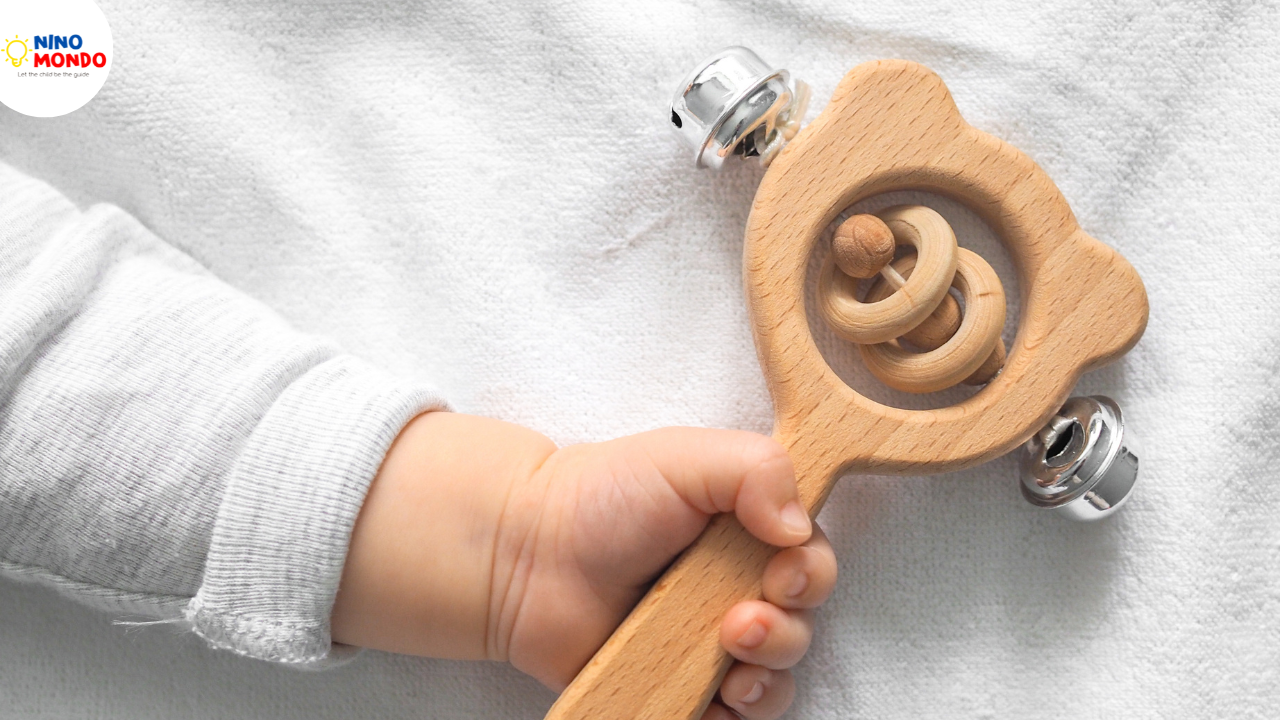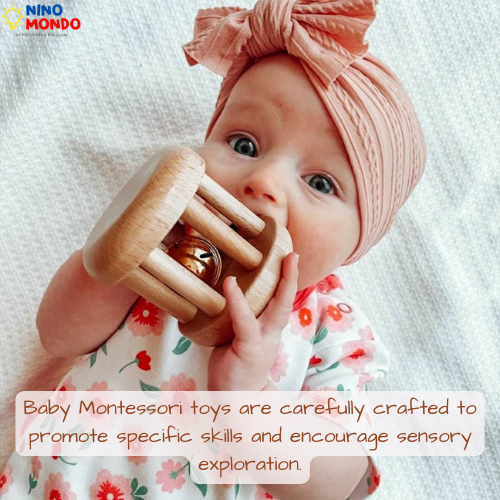Building Fine Motor Skills With Baby Montessori Toys
May 23, 2024
“Give children toys that are powered by their imagination, not by batteries.” - H. Jackson Brown, Jr.
Baby Montessori toys are one effective method for nurturing fine motor skills. They provide opportunities for hands-on learning and exploration in alignment with Montessori education theory. These skills involve coordinating small muscles in the hands and fingers, enabling precise movements.
Let's delve into the significance of fine motor skills and explore how baby Montessori toys, following Montessori education theory, can aid their development.
Understanding Fine Motor Skills
Fine motor skills, encompassing actions involving the small muscles of the hands and fingers and coordination between the eyes and hands, are essential for performing tasks requiring precision, dexterity, and control.
Activities like picking up small objects, holding a spoon, buttoning a shirt, or drawing all involve fine motor skills.
Babies undergo rapid development during infancy and early childhood, and their fine motor skills evolve progressively. As babies explore their surroundings, interact with toys, and engage in play, they refine their motor skills through repetition and practice, which Montessori theory advocates for.
Key fine motor skills that babies need to develop include:
- Grasping: The ability to grip objects with the fingers and palm, starting with a reflexive grasp and progressing to a more refined pincer grasp.
- Hand-Eye Coordination: This involves coordinating the movements of the hands and fingers with visual input, essential for tasks like reaching for objects and stacking blocks.
- Manipulation: The skill of using fingers to manipulate objects, such as turning pages in a book, stacking blocks, or fitting puzzle pieces together.
- Hand Strength and Dexterity: Developing strength and control in the muscles of the hands and fingers, enabling actions like squeezing, pinching, and twisting.
What are Montessori Toys?
A prevalent question among new parents is: What are Montessori toys? Montessori toys are specially designed playthings rooted in the educational philosophy of Maria Montessori, an Italian physician and educator. Montessori toys prioritise simplicity, functionality, and natural materials like wood, fabric, and metal.
Based on the Montessori education theory, these toys promote specific skills and developmental milestones, encouraging independence and creativity. They often mimic real-life objects and activities, allowing children to engage in purposeful play that fosters cognitive, physical, and emotional growth.
In essence of Montessori theory, the toys are tools for learning and discovery that empower children to explore, experiment, and make sense of the world at their own pace.

Baby Montessori Toys for Fine Motor Skills Development
Baby Montessori toys support a child's natural development and promote hands-on learning. Nino Mondo offers a range of baby Montessori toys carefully crafted to enhance fine motor skills while engaging babies in meaningful play. Let's explore how these toys can support the development of fine motor skills:
Beading Set
The Beading Set allows babies to practise their pincer grasping, manipulate small objects, and develop hand-eye coordination. This activity helps your little one build precision and two-hand coordination.
The thread and wooden guidance encourage independent work and refine fine motor skills. Later, you can use a blindfold to make things more challenging and fun. Baby Montessori toys like this encourage focus and concentration.
Colour Matching Activity
The Colour Matching Activity is designed to sort and match colourful shapes, so your little one develops a visual sense of colour. This also refines the baby's cognitive and fine motor skills as they try to fit the skittles in the cup.
This activity fosters problem-solving skills as babies identify matching pairs and group objects based on similarities.
Velcro Dressing
Velcro Dressing offers babies a practical way to develop fine motor skills while learning essential self-care tasks and independence. It is quite a challenge for little hands.
Baby Montessori toys enhance your little one's wrist and finger strength by teaching them to open and close Velcro fasteners. This activity promotes independence and fosters confidence and self-reliance in your kid.
Coin Drop Box
The Coin Drop Box is an engaging toy that encourages babies to refine their pincer grasp, fine motor skills, and writing.
It further develops the concept of object permanence and precision by challenging motor skills. For more fun, you can introduce real coins for more sensory feedback and practice.
The Horizontal Stacker
The Horizontal Stacker is a different type of baby Montessori toy that supports multiple aspects of fine motor skills development as it is not vertical but horizontal.
Stacking horizontally promotes easy dexterity in children. It involves various supple wrist movements that enhance hand-eye coordination, which becomes beneficial for writing and drawing tasks in the future.
Montessori Approach to Toys
Montessori education theory advocates for a child-centred approach to learning, emphasising independence, self-directed activity, and hands-on exploration. Baby Montessori toys, following Montessori theory, are carefully crafted to promote specific skills and encourage sensory exploration.
Baby Montessori toys offer various benefits in the context of fine motor skills development, aligning with the principles of Montessori education theory.
- Focus on Purposeful Activities: Baby Montessori toys are designed to serve a specific purpose, such as stacking blocks, sorting shapes, or threading beads, promoting concentration and problem-solving skills per Montessori theory.
- Encouragement of Independence: Typically, self-correcting allows babies to learn through trial and error, fostering independence and a sense of accomplishment as they master new skills at their own pace, as per Montessori education theory.
- Promotion of Hand-Eye Coordination: These toys require hand-eye coordination, as babies manipulate objects and interact with their environment. This coordination is essential for tasks like writing, drawing, and using utensils.
- Integration of Real-Life Skills: Aligned with Montessori education theory, these baby Montessori toys often mimic everyday objects and activities, such as kitchen utensils, tools, or household items, helping babies develop skills directly applicable to real-life situations.
Fine motor skills are essential for a baby's overall development, laying the foundation for future learning and independence. Baby Montessori toys offer a holistic approach to nurturing these skills, providing babies with opportunities for hands-on exploration and meaningful play.
As babies engage with these toys, they refine their motor skills and build confidence, creativity, and a love for learning that will benefit them throughout life.
A little about us 💛
At Nino Mondo, we believe that every tiny grasp, reach, and touch is a step toward independence. Our Montessori-inspired resources are thoughtfully designed to support your baby’s fine motor development through calm, purposeful play.
Rooted in neuroscience and love, our approach helps parents understand the ‘why’ behind every milestone, making everyday moments deeply meaningful. Because when play is mindful, growth happens naturally—one gentle movement at a time.
FAQS
1. What is the Montessori method of motor education?
The Montessori method of motor education emphasises hands-on learning and self-directed exploration to develop children's fine and gross motor skills. It provides opportunities for independent movement, sensory experiences, and purposeful activities tailored to each child's developmental stage and interests. This approach fosters physical coordination, concentration, and confidence in children's motor abilities.
2. What are fine motor skills?
Fine motor skills involve intricate movements of small muscles in the hands and fingers, enabling precise actions like threading a needle, buttoning a shirt, or writing with a pen.
3. Is colouring a fine motor skill?
Yes, colouring is a fine motor skill as it involves precise movements of the hands and fingers to manipulate crayons or pencils.
Don't miss a beat!
New moves, motivation, and classes delivered to your inbox.
We hate SPAM. We will never sell your information, for any reason.

